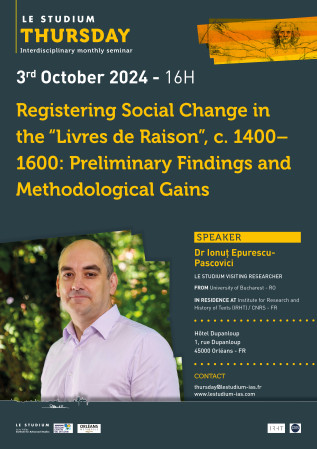Ionuț Epurescu-Pascovici

From
In residence at
Institute for Research and History of Texts (IRHT) / CNRS - FR
Host scientist
Sébastien Barret
BIOGRAPHY
Ionuț Epurescu-Pascovici (PhD in medieval studies, Cornell University) is senior researcher at the University of Bucharest. He is the author of Human Agency in Medieval Society, 1100–1450 (Boydell Press, 2021) and the editor of Accounts and Accountability in Late-Medieval Europe: Records, Procedures, and Socio-Political Impact (Brepols, 2020). In addition, he has published in peer-reviewed journals such as French Historical Studies, The Journal of Medieval Studies, and Viator: Medieval and Renaissance Studies. Between 2015 and 2020 he was the Principal Investigator of the ERC (European Research Council) Starting Grant CASTELLANY ACCOUNTS. His edited volume, Accountability in Late Medieval Europe: Households, Communities, and Institutions is forthcoming from Brepols in December 2024. He is currently preparing a monograph on institutional accountability in late-medieval Savoy.
PROJECT
Registering Social Change: How Historical Transformations Are Reflected in the “Livres de Raison” (c. 1400–1600)
This exploratory research project tackles a fundamental question in historical research, “how to trace societal change over time”, in a specific context – the transition from medieval to early modern society – and from a specific angle: that afforded by the domestic registers known in France as
“livres de raison”. Specifically, the project seeks to identify how the broad societal trends of the period 1400–1600 are reflected in the private records of the literate middle classes. While the major political-institutional, socioeconomic, and cultural developments of this period are well-documented, their impact on the everyday life of the commoners has proved more difficult to assess. This is a general problem in historical research, and particularly thorny in medieval and early modern history, where private records emanating from non-elite milieus are relatively rare. It is in this respect that the “livres de raison” hold the promise of significant findings. In addition to financial lists, transcriptions of property records, and notes about family events, some “livres de raison” include material on local history, advice for posterity, and even the author’s personal reflections, similarly to memoirs. Considering that in this period writing and keeping records required a certain investment of time and resources, the “livres de raison” can be viewed as repositories of consequential knowledge and particularly apt to register notable historical developments. Some “livres de raison” were continued by the second and third generation, which means that the historian can trace historical change within the same register, thus mitigating the effects of genre conventions. This four-month project seeks to test a hypothesis suggested by the preliminary examination of the sources, namely that the “livres de raison” afford us a valuable entry-point into the impact of large-scale historical changes on the households of the middle classes, and develop a methodology adequate to this task.

